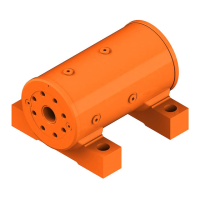25
Parker Hannifin Corporation
Helac/Cylinder Division
Enumclaw, Washington USA
www.helac.com
Helical, Hydraulic Rotary Actuators
L20 Series Service & Repair Manual
Catalog HY34-1120
Troubleshooting Guide
* Replacement parts may be needed.
PROBLEM SEE CAUSES AND SOLUTIONS BELOW
Shaft rotates slowly or not at all 1-6
Operation is erratic or not responsive 7
Shaft will not fully rotate 8,9
Selected position cannot be maintained 3,4,7
CAUSE SOLUTION
1. Insucient torque output Verify correct operating pressure. Do not exceed
OEM's pressure specications. Load may be above
maximum capacity of the actuator.
2. Low rate of uid ow Inspect ports for obstructions and hydraulic lines for
restrictions and leaks.
3. Control or Counterbalance valve has
internal leak
Disconnect hydraulic lines and bypass valve. Leave
valve ports open and operate the actuator through
housing ports (do not exceed OEM's operating
pressure). The valve must be replaced if a steady ow
of uid is seen coming from the valve ports.
4. Piston and/or shaft seal leak Remove the plug and the housing's valve ports.
Operate the actuator through the housing ports.
Conduct the internal leakage test as described in the
Testing Section on page 24 of this manual.
5. Corrosion build-up on the thrust surfaces Re-build the actuator. Remove all rust and then polish.*
6. Swollen seals and composite bearings
caused by incompatible hydraulic uid
(Standard actuators only)
Re-build the actuator. Use uid that is compatible with
seals and bearings. Contact Helac for more information
7. Air in actuator Purge air from actuator. See bleeding procedure
starting on page 24.
8. Twisted or chipped gear teeth from
overload conditions.
Check for binding. Actuator may or may not be able to
be rebuilt and may need to be replaced.
9. Port ttings are obstructing the piston
during stroke
Check thread length of port ttings. Fittings should
not reach inside the housing bore.
Troubleshooting Guide

